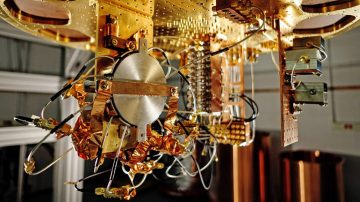
Recently, a paper written by Google scientists was leaked and included conclusions on experiments with a quantum supercomputer. This paper was posted to a science database for a few minutes by an anonymous contributor, and was taken down after a few minutes. It is speculated that an insider accidentally posted the paper.
To put it simply, quantum computers use properties of matter at extremely small scales to advance processing power.
The use of quantum mechanics to accelerate processing power has been thought of in the past but has never been applied to the real world to this scale.
Quantum mechanics is a branch of physics that describes the behavior of particles at a microscopic level, of atoms, of nuclei. The quantum computer takes advantage of a strange but true feature of quantum mechanics. An object can be in several different states and several different places at once. This idea of quantum “superposition” has been confirmed and has been studied over the past century in experiments involving small units of matter, including atoms.
The leaked results of the Google quantum computer were astonishing. When given a computing task that would take a regular supercomputer 10,000 years to finish, the supercomputer completed the task in just 200 seconds. Google labeled their achievement as “quantum supremacy.”
The task given to the computer was to simulate the outputs of a pseudo-random quantum circuit, which is basically a number generator. The term pseudo-random is used because not all numbers have the same chance of appearing, some numbers have more. This is because superposition dictates that each atom, or number in this case, has a number of potential locations and states where it can be. At each instant, the atom can be located at different potential locations.
Some experts in IBM have refuted Google’s claims. They propose that Google gave its quantum computer a tailor-made task that was specifically designed to stump the regular supercomputers. Another point they make is that it shouldn’t be a big surprise that a quantum computer is faster at computing numbers generated with quantum properties.
There is still room for big improvements. During the performance of the task, Google engineers had planned for 54 quantum bits (qubits) to start functioning. When they had started the experiment, they found that one of the qubits were not working, and had to carry on with just 53 qubits.
In quantum computing, a qubit is the basic unit of quantum information—the quantum version of the classical binary bit physically realized with a two-state device. To put in perspective how powerful qubits are, a comparison can be made with the number of particles in the universe. If there was a system of 300 qubits, it would be able to store and process more bits of information than the number of particles in the universe.
There are still some issues in the current version of quantum computers. The most important issue is the errors caused by qubits decaying and losing information stored on them. One solution is to join together physical qubits to create more coherent logical qubits, which will cancel out all the errors. However, hundreds to thousands of physics qubits are required to create one logical qubit.
Junior Sean P. asked, “If these quantum computers become so developed, wouldn’t our privacy be in danger?” For those who are worried about their private data being leaked due to the quantum computers, there is nothing to worry about for the foreseeable future. To make a quantum computer capable of encryption, thousands of logical qubits would be required. To this day, the most physical qubits that engineers have put together are 72 qubits.
While the future of quantum computing is bright, there is still long ways to go.